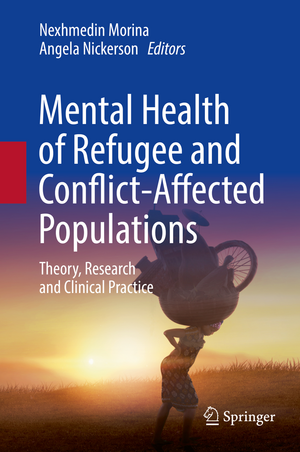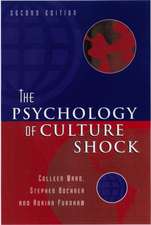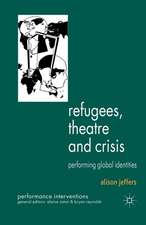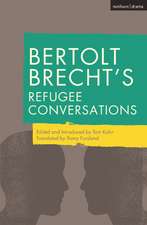Mental Health of Refugee and Conflict-Affected Populations: Theory, Research and Clinical Practice
Editat de Nexhmedin Morina, Angela Nickersonen Limba Engleză Hardback – 20 dec 2018
Preț: 1136.07 lei
Preț vechi: 1195.87 lei
-5% Nou
Puncte Express: 1704
Preț estimativ în valută:
217.41€ • 236.08$ • 182.63£
217.41€ • 236.08$ • 182.63£
Carte tipărită la comandă
Livrare economică 18-24 aprilie
Preluare comenzi: 021 569.72.76
Specificații
ISBN-13: 9783319970455
ISBN-10: 3319970453
Pagini: 370
Ilustrații: XX, 396 p. 15 illus., 5 illus. in color.
Dimensiuni: 155 x 235 mm
Greutate: 0.82 kg
Ediția:1st ed. 2018
Editura: Springer International Publishing
Colecția Springer
Locul publicării:Cham, Switzerland
ISBN-10: 3319970453
Pagini: 370
Ilustrații: XX, 396 p. 15 illus., 5 illus. in color.
Dimensiuni: 155 x 235 mm
Greutate: 0.82 kg
Ediția:1st ed. 2018
Editura: Springer International Publishing
Colecția Springer
Locul publicării:Cham, Switzerland
Cuprins
Part 1. Mental Health in Refugee and Conflict-Affected Populations.- Chapter 1. Mental Health Among Survivors of War in Low- and Middle-Income Countries: Epidemiology and Treatment Outcome (Nexhmedin Morina).- Chapter 2. Mental Health, Pre-migratory Trauma and Post-migratory Stressors Among Adult Refugees (Jessica Carlsson).- Chapter 3. Child Mental Health in the Context of War: An Overview of Risk Factors and Interventions for Refugee and War-Affected Youth (Elizabeth A. Newnham).- Part 2 . Historical Perspectives and Theoretical Frameworks in Refugee and Conflict-Affected Mental Health.- Chapter 4. Variations of Military Violence: Structures, Interests, and Experiences of War from the 19th to the 21st Century (Jörg Echternkamp).- Chapter 5. Pathways to Recovery: Psychological Mechanisms Underlying Refugee Mental Health (Angela Nickerson) .- Chapter 6. Drive to Thrive: A Theory of Resilience Following Loss (Kai Hou).- Chapter 7. A Neurobiological Perspective of Mental Health FollowingTorture Trauma (Belinda Liddell).- Chapter 8.Interventions for Mental Health and Psychosocial Support in Complex Humanitarian Emergencies: Moving Towards Consensus in Policy and Action? (Peter Ventevogel).- Part. 3. Psychological Interventions and Relevant Clinical Considerations in Working with Refugee and Conflict-Affected Populations.- Chapter 9. Narrative Exposure Therapy (NET) as a Treatment for Traumatized Refugees and Post-Conflict Populations (Frank Neuner) .- Chapter 10. Culturally Sensitive CBT for Refugees: Key Dimensions (Devon Hinton).- Chapter 11. Alcohol and Drug Misuse Interventions in Conflict-Affected Populations (M. Claire Greene).- Chapter 12. Trauma Systems Therapy for Refugee Children and Families (Molly Benson).- Chapter 13. Supporting Children Affected by War: Towards an Evidence based Care System (Mark, J. D. Jordans).- Chapter 14. Clinical Considerations in the Psychological Treatment of Refugees (Matthis Schick).- Chapter 15. Legal and Ethical ConsiderationsRelated to the Asylum Process (Jane Herlihy).- Part 4. Research and Clinical Advances in Refugee and Conflict-Affected Mental Health.- Chapter 16. Conceptualization and Measurement of Traumatic Events among Refugee and Other War-Affected Populations (Andrew Rasmussen).- Chapter 17. Low Intensity Interventions for Psychological Symptoms following Mass Trauma (Katie Dawson).- Chapter 18.Development and Evaluation of Mental Health Interventions for Common Mental Disorders in Post-Conflict Settings (Paul Bolton).- Chapter 19.New Technologies in the Treatment of Psychological Disorders – Overview, Potentials and Barriers for Conflict-Affected Populations (Jana Stein).- Chapter 20. Conclusion (Angela Nickerson).
Recenzii
“The volume provides a comprehensive contemporary resource for scholars and practitioners working with post-conflict populations. … the strengths of the book are the inclusion of approaches examining the underlying psychological processes of trauma and the considerations of supporting refugees beyond mere individual treatment of specific diagnoses. Summing Up: Recommended. Graduate students, researchers, and professionals.” (I. I. Katzarska-Miller, Choice, Vol. 56 (11), July, 2019)
Notă biografică
Nexhmedin Morina, Ph.D., is professor of Clinical Psychology and Psychotherapy at the University of Münster, Germany, and director of the Centre for the Treatment of Traumatic Stress Disorders. His research interests include investigating mental health in survivors of mass conflict as well as the evaluation of mental health services.
Angela Nickerson, Ph.D., is Associate Professor and Director of the Refugee Trauma and Recovery Program at the University of New South Wales (UNSW), Sydney, Australia. She is a clinical psychologist and conducts research into psychological and social mechanisms underlying the mental health of refugees and asylum-seekers, with the aim of informing policy and treatment development.
Textul de pe ultima copertă
This book provides an overview of theoretical, empirical, and clinical conceptualizations of mental health following exposure to human rights violations (HRV). There are currently hundreds of millions of individuals affected by war and conflict across the globe, and over 68 million people who are forcibly displaced. The field of refugee and post-conflict mental health is growing exponentially, as researchers investigate the factors that impact on psychological disorders in these populations, and design and evaluate new treatments to reduce psychological distress. This volume will be a substantial contribution to the literature on mental health in refugee and post-conflict populations, as it details the state of the evidence regarding the mental health of war survivors living in areas of former conflict as well as refugees and asylum-seekers.
Caracteristici
Provides an evidence-based review of refugee and post-conflict mental health following exposure to human rights violation Outlines theoretical models driving research and practice from key perspectives, such as psychology, sociology, anthropology and biology Highlights cutting-edge research innovations to further knowledge about refugee and postconflict mental health











